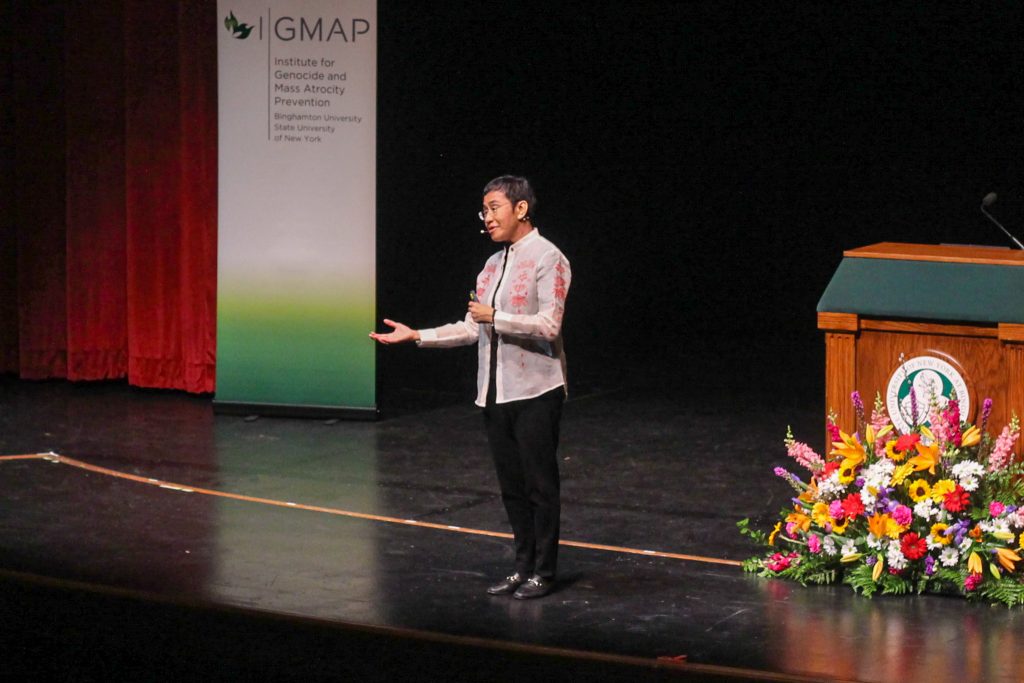A 2021 Nobel Peace Prize laureate was awarded the first-ever Nadia Rubaii Memorial Prize on Friday.
Maria Ressa, founder of the Philippines’ top digital news site Rappler, was honored as the inaugural recipient of the Nadia Rubaii Memorial Prize — created by Binghamton University’s Institute for Genocide and Mass Atrocity Prevention (I-GMAP). The award is given to individuals who best represent the work of Rubaii, I-GMAP’s late co-founder and co-director, and her commitment to human rights.
The ceremony occurred at the Chamber Hall during Frontiers of Prevention, I-GMAPs annual international forum that invites worldwide scholars to discuss critical global issues. After receiving the award, Ressa delivered a lecture titled “The Battle for Our Future,” which discussed the rising risks of mass atrocity through digital media and disinformation that have caused division, polarization and violence in contemporary society.
Kerry Whigham, co-director of I-GMAP and an assistant professor of public administration, described how the Nadia Rubaii Memorial Prize was created.
“Before her untimely death in 2022, Nadia was a professor and practitioner of public administration at [BU],” Whigham wrote in an email. “In 2016, she was handpicked to co-found I-GMAP, the first university-based institute of its kind with an exclusive focus on preventing genocide and other mass atrocities. In honor of Rubaii’s amazing legacy, the I-GMAP team created the Nadia Rubaii Memorial Prize.”
Ressa has worked as an investigative journalist in Asia for over 30 years. In this capacity, she has reported on autocratic governments in the region, which issued countless bail, arrest warrants and threats of life-long imprisonment against her. Her reporting has recently centered on how Philippines President Rodrigo Duterte’s regime has utilized Facebook to allegedly spread hate for political gains.
Ressa’s work has been acknowledged both by I-GMAP and the Nobel Committee. In 2021, the co-directors of I-GMAP interviewed Ressa and invited her to a webinar, where she spoke about the battle for democracy and press freedom. An hour after the webinar, Ressa was announced as the 2021 Nobel Peace Prize laureate.
After the ceremony, Ressa delivered a speech urging the audience to pay attention to the rising dangers of social media as a platform to spread hate and put democracy at risk. She said data has been corrupted by design.
“Human beings are commodified again with technology like they were with labor during the industrial revolution,” Ressa said. “Tech companies, realizing that anger, fear and hate make us scroll down, have allowed and planted the attention economy in our lives. Through social media, lies spread faster than facts, creating distrust and breaking journalism. Contemporary genocide and mass atrocity utilize disinformation promoted by social media platforms like Facebook.”
Ressa also described how disinformation and hatred threaten the grassroots of democracy and civil society.
“Digital platforms dominated by lies create a critical problem,” Ressa said. “Lies hide and distort facts. If you cannot have facts, there is no truth. Without truth, there cannot be any trust. Without trust, we cannot have a shared reality and democracy. If you do not have integration of facts, you cannot have integration of elections.”
I-GMAP is planning to award the Nadia Rubaii Memorial Prize annually. The institute believes that the prize will honor Rubaii’s work and solidify I-GMAP’s role as a global leader in building bridges between scholars, activists and government officials.
After giving her final remarks, Ressa was met with a standing ovation from the audience, including BU students, faculty and conference attendees.
Josh Cheuk, a freshman majoring in integrative neuroscience, said Ressa highlighted a new perspective on journalism’s role in people’s daily lives.
“I came here out of pure interest and wanted to know more about misinformation and its utilization,” Cheuk said. “I was intrigued to hear how knowledge is passed and how people can use that knowledge for both good and bad.”
Junhyeok Kim, a sophomore double-majoring in English and politics, philosophy and law, noted that such events can help students in choosing careers.
“These informative events help and guide me to learn what I want to do in the future,” Kim said.



